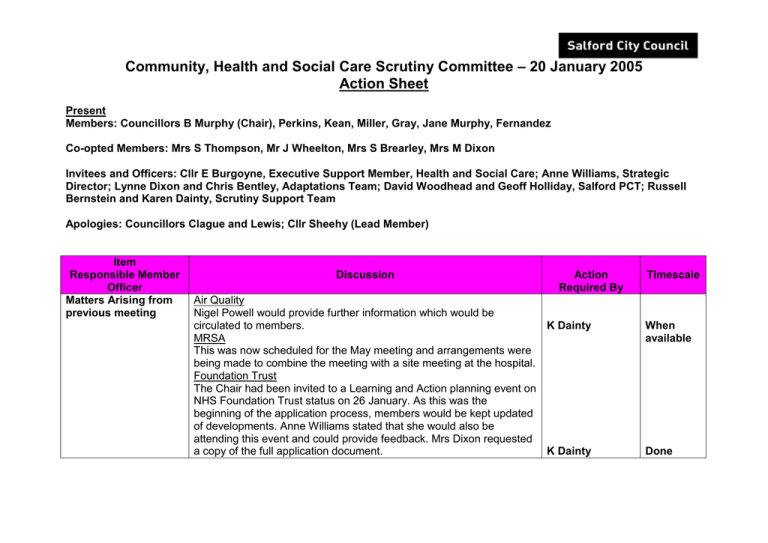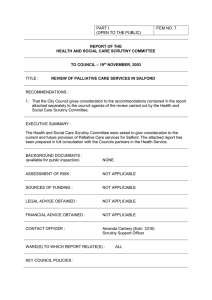
Community, Health and Social Care Scrutiny Committee – 20 January 2005
Action Sheet
Present
Members: Councillors B Murphy (Chair), Perkins, Kean, Miller, Gray, Jane Murphy, Fernandez
Co-opted Members: Mrs S Thompson, Mr J Wheelton, Mrs S Brearley, Mrs M Dixon
Invitees and Officers: Cllr E Burgoyne, Executive Support Member, Health and Social Care; Anne Williams, Strategic
Director; Lynne Dixon and Chris Bentley, Adaptations Team; David Woodhead and Geoff Holliday, Salford PCT; Russell
Bernstein and Karen Dainty, Scrutiny Support Team
Apologies: Councillors Clague and Lewis; Cllr Sheehy (Lead Member)
Item
Responsible Member
Officer
Matters Arising from
previous meeting
Discussion
Action
Required By
Air Quality
Nigel Powell would provide further information which would be
circulated to members.
K Dainty
MRSA
This was now scheduled for the May meeting and arrangements were
being made to combine the meeting with a site meeting at the hospital.
Foundation Trust
The Chair had been invited to a Learning and Action planning event on
NHS Foundation Trust status on 26 January. As this was the
beginning of the application process, members would be kept updated
of developments. Anne Williams stated that she would also be
attending this event and could provide feedback. Mrs Dixon requested
a copy of the full application document.
K Dainty
Timescale
When
available
Done
Community, Health and Social Care Scrutiny Committee – 20 January 2005
Action Sheet
Waiting Times for
Adaptations –
Anne Williams presented an update report on this issue which
members had requested following a report received at the September
2004 meeting.
Anne Williams
The money for adaptations came through Housing Services
The relevant Performance Indicators were monitored through
Social Services and so they had a major interest in improving
services
The delays were occurring around major adaptations – those
above £1000.
Those under that amount were funded through Social Services
and the PCT. The required timescale for these are 7 days and
Salford is one of the leading authorities in this area.
The delays in major adaptations were a problem nationally, but
in Salford people were waiting longer than elsewhere
A drive to reduce the waiting time for assessments had shifted
the delay to the waiting times for adaptations.
Anne outlined the package of measures which were being proposed to
improve waiting times. If the scrutiny committee were in favour of
these, a fuller report would be presented to Cabinet on the policy
changes required.
Members raised a number of points, including:
Why NPHL let bungalows to single men, instead of older
people?
Many of the bungalows were a studio design and not suitable for
wheelchair users.
Community, Health and Social Care Scrutiny Committee – 20 January 2005
Action Sheet
How long did it take for an Occupational Therapy assessment?
A maximum of 10 weeks – sooner for high priority cases.
Could recycling/reusing of equipment provide efficiency
savings?
There was already a good return of equipment. The service ran 6 days
per week for delivery/collection of equipment and would eventually run
7 days per week.
Could community care monies be used to fund adaptations, for
example, as this could prevent the cost of alternative care?
Community Care monies were flexible, but could not be used as
capital.
Members endorsed and supported the proposals in the report
and asked that the following points be taken into consideration:
1. £1000 was not thought to be a reasonable limit for minor
adaptations and consideration should be given to increasing
this amount.
2. There should be improved regulations on new building
developments and commitment to Lifetime Homes Standard.
Report of Sexual
Health
Services/Sexually
Transmitted Infections
in Salford
Geoff Holliday presented a report giving an overview of the current
work to bring together the Family Planning Services (FPS) and Genito
Urinary Medicine (GUM) to develop an integrated community based
service.
This would provide a hub and spoke model, with a specialist centre
Anne Williams
Community, Health and Social Care Scrutiny Committee – 20 January 2005
Action Sheet
Geoff Holliday:
Service Development
Manager, Salford PCT,
Sexual Health
Services
and a number of community based sexual health clinics. The current
GUM service had hit capacity at 3,696 cases p.a. The new
arrangements would allow the combined service to meet projected
demand by 2008 of around 16,000 (GUM and FPS).
HIV cases numbered 238. This was double the figure for Manchester
and showed a much quicker rate of increase than anywhere else in
Greater Manchester.
The national target was for access to GUM treatment within 48 hours
by 2008. In Salford, the new arrangements should see this target
being met in 18 months time.
He explained the need to integrate sexual health within the wider
context of emotional and psychological health in order to focus on
prevention. There was also a collective responsibility across agencies
as social and economic factors did underpin sexual health.
Members raised a number of points:
Would the new arrangements improve the waiting times for
psychosexual counselling?
Specialist services such as this were included within the service
redesign
The waiting times were a concern – were there enough staff to
meet the challenge?
The change of posts from part time to whole time should improve
standards.
Had consideration been given to mobile units targeting specific
populations?
Community, Health and Social Care Scrutiny Committee – 20 January 2005
Action Sheet
There was a service for young people based at one of the colleges,
however, there was doubt as to whether a mobile approach actually
improves public health.
What was the role of the GP?
Geoff said that most GPs would refer to the specialist service. GPs
were not yet up to speed, but the service would like them to come on
board. Members felt that GPs should offer some initial treatment, if
people went to them in the first instance.
There was concern expressed about whether the services
tackled some of the lifestyle choices people made which
resulted in them having to seek treatment and whether there
was a message encouraging people to have sex, providing it
was safe? Also about the links to binge drinking.
Geoff said that staff would try to advise in a non –judgemental way. In
addition educative/preventative work was addressed through links with
other agencies, such as the youth service, healthy schools, etc.
Members felt that there was a responsibility on the service to provide
information and education.
Why were the figures for syphilis so much worse?
This was not fully understood, but this was one of the 3 areas with
outbreaks (others were centred around London and Brighton).
Regarding a question about funding for the service, Geoff explained
that this was all mainstream NHS funding. Figures would be provided
to the members for further information.
Geoff Holliday
When
Community, Health and Social Care Scrutiny Committee – 20 January 2005
Action Sheet
available
Public Health Update
David Woodhead
Heart Disease
Research by the Health Development Agency on the impact of work
targeting public health, showed 70k fewer deaths from heart disease in
2000 than in 1981. Of this 40% of the reduction was ascribed to
medical/surgical treatment, 60% was due to risk factors, i.e., not
smoking, better diet, increased physical activity, etc, showing that
prevention was more effective than intervention.
In Salford in 1987 933 people died from heart attacks. In 2000 this had
reduced to 503.
In the last quarter, the smoking cessation team had supported 339
people to quit smoking – which surpassed their target of 291.
Progress on heart disease related deaths in Salford was however
slower than elsewhere.
Press reporting of health issues
David gave examples of recent health “scares” reported in the media,
where there was no conclusive evidence and the need to keep the
focus on public health priorities.
The Manchester Evening News would be running a series of articles
around Smoke Free Greater Manchester and it was hoped to include
in this information about the work on Tobacco Control in Salford.
Tobacco Control
The final draft was endorsed by the members. Arrangements would
Community, Health and Social Care Scrutiny Committee – 20 January 2005
Action Sheet
Report
Russell Bernstein
now be finalised to take the report to Cabinet and the PCT and
arrange a launch event.
Work Programme
2004/05
Mrs Dixon asked that thanks be recorded to former Chair Val
Burgoyne, David Woodhead and the officers involved for the work they
had put in.
NPHL
In response to a request for the Lead Member for Housing and a
representative from NPHL to attend a meeting in respect of major
adaptations, it was agreed to await the outcome of the more detailed
report going to cabinet.
Forward Plan
AOB
The rest of the work programme was agreed.
There were no issues arising.
NWICAS
Further to the information members had received, it was agreed that
the next quarterly report produced would be brought to the committee.
In the meantime, a meeting would be arranged with the officers from
NWICAS to see what formal/informal processes could be put in place.
Karen Dainty
Feb 2005
Briefing Session
Its was agreed that there would be a briefing session commencing at
1:30pm, prior to the next meeting on 17 February. This would allow
time for members to discuss any particular lines of questioning. Copies
of the questioning forms distributed at the member training session
would be available.
Karen Dainty
Feb 2005
Councillor B Murphy
Councillor Murphy informed the members that he had been elected
Community, Health and Social Care Scrutiny Committee – 20 January 2005
Action Sheet
Chair
Deputy Mayor from May 2005 and would then have to stand down as
Chair of this committee. Members congratulated Cllr. Murphy on his
appointment.
Councillor Bernard Murphy
0161 792 3628
Assistant Director of Scrutiny
Russell Bernstein
0161 793 3530
Principal Scrutiny Support Officer
Karen Dainty
0161 793 2513

